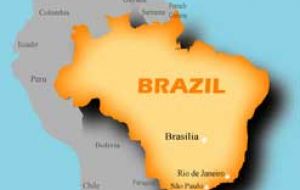MercoPress. South Atlantic News Agency
Future is here: Brazilian economy at its best in 25 years
 Brazil's economy grows up
Brazil's economy grows up For years, the joke in this country was that Brazil's economy was the economy of the future. The morose punchline, of course, was that the future never arrives. But finally, it seems, the future is now.
Just peek into Embraer's Hangar F220 in this city north of São Paulo, where the high-flying commercial aircraft maker was recently putting finishing touches on a dozen gleaming new aircraft being readied for delivery to airlines around the world, including Northwest, Air Canada, Tame of Ecuador and Virgin Australia. Or visit Odebrecht in Salvador in Brazil's northeast. It is managing billions of dollars worth of international public works projects, including its second $1 billion bridge over Venezuela's Orinoco River and a piece of the Panama Canal expansion. And then there's Petrobras, the quasi-state oil company, whose engineers have launched deep-water drilling projects in places as far afield as Angola, Colombia and the Gulf of Mexico. Petrobras announced last fall it had discovered what may be the world's largest oil find in 25 years in Brazil's offshore Tupi field. Tupi could propel Brazil into the ranks of significant oil exporters. After several boom and bust cycles in recent decades, Brazil is in the midst of its best sustained economic growth since the 1970s. Optimism here is high that the country may have turned the corner on the road to stability. And the emergence of companies such as Embraer, Odebrecht and Petrobras is one major factor in Brazil's improved fiscal health. "The Brazilian economy is probably at its best moment in 25 years," said Paulo Levy, economist at the Rio-based think tank known by its Portuguese initials IPEA. Exports of manufactured goods and services have given Brazil's economy balance and helped foreign reserves climb to $167 billion, double the figure of September 2006. The country has paid down its debt, lowered interest rates and kept a lid on spending. Economic growth will come in at 5.3 percent for 2007, lower than the hemisphere's 5.7 percent, but quite a feat for a country that over the previous 10 years averaged only 2.5 percent annual expansion. Foreign investors have taken notice, evidenced by the 44 percent increase in the Bovespa stock index in 2007, the fifth year of growth. That's a bigger percentage gain than in Russia, Chile or South Korea, even though Brazil's GDP growth rate for 2007 will fall short of those countries. Of course, Brazil still faces some serious challenges that could take the wind out of its economic sales. President Luiz Inacio Lula da Silva has invested little in infrastructure, and São Paulo economist Roberto Troster said that is causing Brazil to slip in world competitiveness. Roads and ports are overloaded. Electricity demand is growing so fast ? 6 percent nationwide per year ? that power may be rationed as early as this year if there is a cut-off of gas from Bolivia, which supplies half of Brazil's needs, or if inadequate rainfall reduces hydropower output, said Adriano Pires, who heads a Rio think tank that studies infrastructure. Taxes are 36 percent of gross national product, among the highest in the world. A deep U.S. or global economic downturn would be damaging to Brazil's economy because it would dampen demand for its commodities, which account for 53 percent of all its exports. São Paulo economist Troster said it's too early to declare that Brazil's economy has diversified enough and fundamentally changed. "We're not turning a corner, we're repeating a cycle," he said. (Los Angeles Times)




Top Comments
Disclaimer & comment rulesCommenting for this story is now closed.
If you have a Facebook account, become a fan and comment on our Facebook Page!